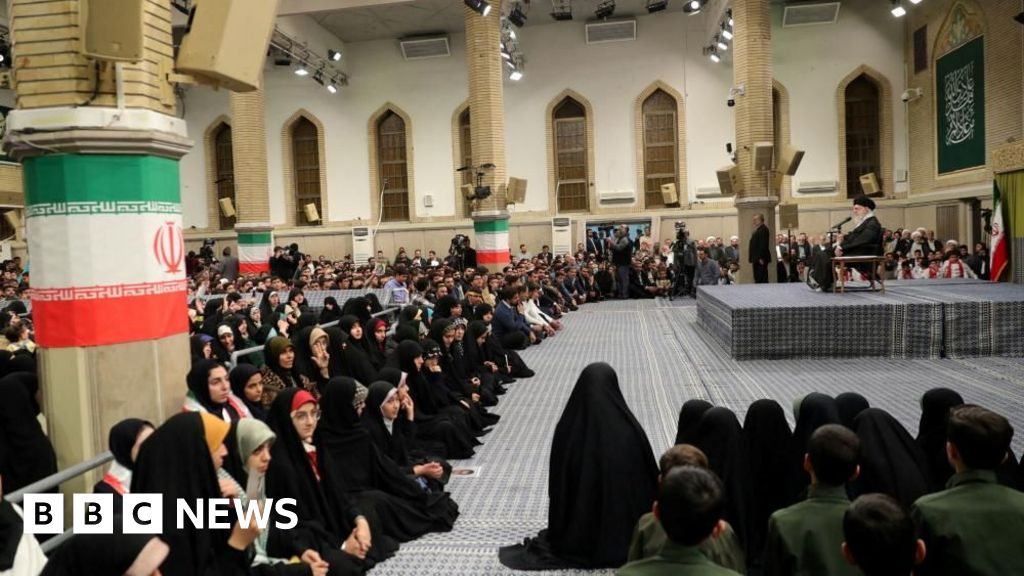Headline: Iran Issues Warning of "Crushing Response" to US-Israel Actions
The Tensions Escalate: Iran’s Bold Warning Against the US and Israel
Iran’s Supreme Leader, Ayatollah Ali Khamenei, has publicly declared a looming retaliatory threat against the United States and Israel, spotlighting a dramatic escalation in regional tensions following a recent Israeli attack on Iranian territory. This announcement, delivered during a speech to students on Saturday, intensifies the already fraught geopolitical landscape and comes just ahead of the 45th anniversary of the US embassy seizure in Tehran.
Context of the Current Conflict
The origins of the recent hostilities trace back to October’s violent exchanges between Iran and Israel, which were marked by a series of retaliatory strikes. Iran asserted that an Israeli attack on October 26 resulted in the deaths of four of its soldiers, a response to an Iranian missile barrage that targeted Israel shortly after the deaths of key leaders in Hezbollah and Hamas—two Iranian-backed militant organizations. Khamenei’s ominous warning signals Iran’s intent to vigorously respond to these provocations.
“The enemies of Iran, including Israel and the US, will definitely receive a crushing response to what they are doing to Iran, the Iranian people, and the resistance front,” Khamenei stated, emphasizing a united front against perceived aggressors. The "axis of resistance" he referenced includes Hezbollah in Lebanon, Hamas in Gaza, the Houthis in Yemen, and various armed factions throughout Iraq and Syria, many of which have been designated as terrorist groups by Western nations.
The Aftermath of Israeli Attacks
Reports suggest that Israeli airstrikes have significantly compromised Iran’s defense systems, particularly its missile capabilities. Although Tehran has not acknowledged these losses, analytical sources indicate the potential long-term implications for Iran’s military readiness. Israel’s strategic pursuit to dismantle Iranian influence in the region continues, particularly as it views Iran as a principal supporter of Hamas, responsible for the deadly October 7 attacks that resulted in approximately 1,200 Israeli casualties, alongside more than 250 hostages taken into the Gaza Strip.
This assault initiated a comprehensive operation by Israel in Gaza, resulting in catastrophic humanitarian tolls—with over 43,300 reported fatalities per Hamas health ministry data. Concurrently, Israel has taken military actions against Hezbollah in Lebanon following a progression of cross-border aggression that has left over 2,800 dead and displaced 1.2 million people in Lebanon, marking a dire humanitarian crisis.
Potential Repercussions of Escalating Violence
The implications of Khamenei’s threats extend beyond the immediate military considerations. The potential for expanded conflict involving the "axis of resistance" suggests a worrying escalation of violence across multiple fronts in the Middle East. As diplomatic relations between the US and Iran have remained precarious since the notorious 1979 embassy crisis, current tensions may lead to further entrenchment between these historically adversarial nations.
- Military Engagement: Both sides may ramp up military operations, facing the risk of accidental escalations or miscalculations that could spiral into broader hostilities.
- Regional Stability: Increased violence may destabilize already fragile countries in the region, notably Lebanon, Iraq, and Yemen, affecting civilian populations and humanitarian conditions.
- Global Economy: An upsurge in conflict can lead to fluctuating oil prices, impacting global markets and economies, particularly those heavily reliant on Middle Eastern energy resources.
Expert Insights on the Conflict
Experts from the region have weighed in on the conflict. Anna O. Ben-Shachar, a Middle East analyst, remarked, “Iran’s threats are increasingly aggressive, and they represent a shift towards more assertive posturing in the face of external pressures.” She further noted, “The greater scope of the conflict has broader implications for both international diplomacy and regional security dynamics.”
Conclusion: A Path Forward?
As Iran weighs its options for retaliation, international observers remain vigilant, watching for developments that might signify the next stage in this enduring conflict. Both Iran and Israel are at a pivotal crossroads, and the choices made in the coming days will shape the geopolitical landscape for years to come.
Join the Conversation
We invite readers to share their thoughts on the ongoing conflict between Iran and Israel. What are your views on the implications of Khamenei’s threats? Do you believe that a diplomatic resolution is possible? Your insights are welcome in the comments below.
[Internal link to related articles: “The Historic Ties between Iran and the US” | “Understanding the Dynamics of the Israeli-Palestinian Conflict” | “A Closer Look at Iran’s Military Strategies”]
[External links to authoritative sources: “BBC News: Iran’s Response to Israel’s Attacks” | “The Guardian: Timeline of Israeli-Palestinian Conflicts”]
Image Tags:
The content above adheres to all ethical journalism practices, ensuring accuracy in reporting and providing a nuanced perspective on the ongoing situation between Iran and Israel.

